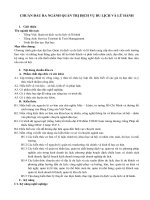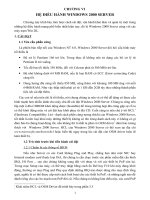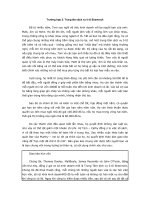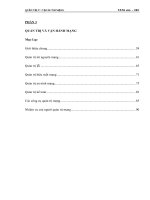Tài liệu quản trị dịch vụ introduction to service management
Bạn đang xem bản rút gọn của tài liệu. Xem và tải ngay bản đầy đủ của tài liệu tại đây (115.34 KB, 18 trang )
Instructor: Nguyen Manh Tuan
Spring 2014
Quản trị Dịch vụ
INTRODUCTION TO SERVICE MANAGEMENT
1. LEARNING OBJECTIVES
Upon successful completion of this course, students should be able to:
1.
Develop a service oriented thinking and service mindset (SERVICE THINKING)
2.
Describe and discuss the notions and perspectives of service businesses, the management
principles and organizational aspects guide service businesses
3.
Articulate the key components of a service system, and how a service system requires the
integration of people, business processes and technologies ( DESIGN THINKING)
4.
Gain an appreciation of ICT based opportunities for service business
5.
Become knowledgeable participants and actors in service decisions and management
6.
Understand and employ systems thinking in dealing with the service related phenomena. Gain
problem solving skills through business case analysis ( SYSTEMS THINKING)
Instructor: Nguyen Manh Tuan
sm schedule Feb 2014 V2ing 2014
Page 2 of 18
2. COURSE MATERIALS
The course employs (i) textbooks, (ii) business case studies, and (iii) research papers.
Students should read the lecture materials and/or articles and cases assigned before the class in
which they will be discussed.
The business cases and the research papers will be assigned during the semester.
Textbooks
Fitzsimmons, J. A., Fitzsimmons, M.J. & Bordoloi S.K. (2014). Service Management:
Operations, Strategy, and Information Technology, 8th Ed., Irwin/McGraw-Hill.
Teboul, J. (2006). Service is Front Stage: Positioning Services for Value Advantage. Palgrave
MacMillan.
Books (recommended)
1. Ellet, W. (2007). The Case Study Handbook. Harvard Business School Press
2. Chesbrough, H. (2011). Open Service Innovation. Jossey-Bass.
3. Woodside, M. & McClam, T. (2009). An Introduction to Human Services. Thomson
Brooks/Cole.
4. Yagil, D. (2008). The Service Providers. Palgrave Macmillan.
Instructor: Nguyen Manh Tuan
sm schedule Feb 2014 V2ing 2014
Page 3 of 18
5. Nankervis, A. (2005). Managing Services. Cambridge University Press. (Asia–Pacific and
Australasian regions).
6. Edvardsson, B. & Enquist, B. (2009). Values-based Service for Sustainable Business - Lessons
from IKEA. Routledge.
7. Allen, P. (2006). Service Orientation - Winning Strategies and Best Practices. Cambridge
University Press.
8. Raisanen, V. (2006). Service Modeling: Principles and Applications. John Wiley & Sons.
9. Alter, S. (2006). The Work System Method: Connecting People, Processes, and IT for Business
Results. Work Systems Press
10. Liautaud, B. (2000). e-Business Intelligence: Turning Information into Knowledge into
Profit. McGraw-Hill.
11. Amartya Kumar Sen. (2000). Development as Freedom. Anchor Books.
12. Songok Han Thornton and William H. Thornton. (2008). Development without Freedom.
Ashgate.
Instructor: Nguyen Manh Tuan
sm schedule Feb 2014 V2ing 2014
Page 4 of 18
Research papers:
The reading will be selected from the following list. This list is not all inclusive and other
articles or cases may be assigned.
Vargo, S.L. & Lusch, R.F. (2008). Service-Dominant Logic: Continuing the Evolution. Journal
of the Academy of Marketing Science, 36(1), 1-10.
Alter, S. (2008). Service system fundamentals: Work system, value chain, and life cycle. IBM
Systems Journal, 47(1), 71-85.
Kwan, S.K. & Min, J.H. (2008). An Evolutionary Framework of Service Systems. International
Conference on Service Science, Beijing, China, April 17-18.
Vargo, S.L., Sampson, S.E. & Froehle, C.M. (2006). Foundations and implications of a
proposed unified services theory. Production and Operations Management, 15, 329-343.
Lusch, R.F. (2004). The Four Service Marketing Mysths: Remnants of a goods-Based,
Manufacturing Model. Journal of Service Research, 6 (4), 324-335.
Vargo, S.L. & Lusch, R.F. (2004). Evolving to a New Dominant Logic for Marketing. Journal
of Marketing, 68(1), 1-17.
Parasuraman, A., Zeithmal V.A., & Malhotra. A. (2005). E-S-Qual: A Multiple-Item Scale for
Assessing Electronic Service Quality. Journal of Service Research, 7(3), 213-233.
Instructor: Nguyen Manh Tuan
sm schedule Feb 2014 V2ing 2014
Page 5 of 18
Bitner, M.J. (1990). Evaluating Service Encounters: The Effects of Physical Surroundings and
Employee Responses. Journal of Marketing, 54(2), 69-82.
Smith, A.K, Bolton, R.N, & Wagner, J. (1999). A Model of Customer Satisfaction with Service
Encounters Involving Failure and Recovery. Journal of Marketing Research. 36, 356–372
McAfee, A.P. (2006). Enterprise 2.0: The Dawn of Emergent Collaboration. Sloan
Management Review, 47(3). 21-28.
Kohli, R. (2007). Innovating to Create IT-Based New Business Opportunities at United Parcel
Service. MIS Quarterly Executive.
Harris, P. (2009). Help Wanted: “T-Shaped” Skills to Meet 21st Century Needs. T+D, 63(9),
42-47.
Weill, P. & Ross, J. (2005). A Matrixed Approach to Designing IT Governance. MIT Sloan
Management Review, 46(2), 25-34.
(Harvard Business Review papers)
A Practical Guide to Combining Products + Services. Shankar, Venkatesh; Berry, Leonard L.;
Dotzel, Thomas. Harvard Business Review. Nov2009, 87(11), 94-99. (R0911H)
What Service Customers Really Want. Dougherty, Dave; Murthy, Ajay. Harvard Business
Review. Sep2009, 87(9), 22-22. (F0909C)
Investing in the IT that makes a competitive difference. Andrew, McAfee, Erik Brynjolfsson.
Harvard Business Review. Sep2008, 98-107. (R0807J)
Instructor: Nguyen Manh Tuan
sm schedule Feb 2014 V2ing 2014
Page 6 of 18
Putting the Service-Profit Chain to Work. Heskett, James L.; Jones, Thomas O.; Loveman,
Gary W.; Sasser, Jr., W. Earl; Schlesinger, Leonard A. Harvard Business Review. JulAug2008, 86(7/8), 118-129. (R0807L)
How to Sell Services more Profitably. Reinartz, Werner; Ulaga, Wolfgang. Harvard Business
Review. May2008, 86(5), 90-96. (R0805F)
The Four Things a Service Business Must Get Right. Frei, Frances X. Harvard Business
Review. Apr2008, 86(4), 70-80. (R0804D)
Breaking The Trade-off Between Efficiency and Service. Frei, Frances X. Harvard Business
Review. Nov2006, 84(11), 92-101. (R0611E)
Four Strategies for the Age of Smart Services. Allmendinger, Glen; Lombreglia, Ralph.
Harvard Business Review. Oct2005, 83(10), 131-145. (R0510J)
The Surprising Economics of a “People Business”. Felix Barber and Rainer Strack. Harvard
Business Review. Jun2005. 1-10. (R0506D)
Will You Survive the Services Revolution?. Karmarkar, Uday. Harvard Business Review.
Jun2004, 82(6), 100-107. (R0406G)
The Lean Service Machine. Swank, Cynthia Karen. Harvard Business Review. Oct2003,
81(10), 123-129. (R0310J)
R&D Comes to Services. Thomke, Stefan. Harvard Business Review. Apr2003, 81(4), 70-79.
(R0304E)
Instructor: Nguyen Manh Tuan
sm schedule Feb 2014 V2ing 2014
Page 7 of 18
Want to Perfect Your Company's Service? Use Behavioral Science. Chase, Richard B.; Dasu,
Sriram. Harvard Business Review. Jun2001, 79(6), 78-84. (R0106D)
Exploding the Self-Service Myth. Moon, Youngme; Frei, Frances X. Harvard Business Review.
May-Jun2000, 78(3), 26-27. (F00304)
Managing Our Way To Higher Service-Sector Productivity. van Biema, Michael; Greenwald,
Bruce. Harvard Business Review. Jul-Aug1997, 75(4), 87-95. (97410)
Learning from Customer Defections. Frederick F. Reichheld. Harvard Business Review. MarApr1996, 57-69*.
Making the Most of the Best. Quinn, Anderson, Findelstein. Harvard Business Review. MarApr1996, 71-88*. (96209)
Exploiting the Virtual Value Chain. Rayport and Sviokla. Harvard Business Review. NovDec1995, 75-85*. (95610)
Why Satisfied Customers Defect. Thomas O. Jones and W. Earl Sasser, Jr.. Harvard Business
Review. Nov-Dec1995, 89-99*. (95606)
Competing on Customer Service: An Interview with British Airways' Sir Colin Marshall.
Prokesch, Steven E. Harvard Business Review. Nov-Dec1995, 73(6), 100-112.
Control in an Age of Empowerment. Robert Simons. Harvard Business Review. Mar-Apr1995,
80-88*. (95211)
Putting the Service-Profit Chain to Work. Heskett, Jones, Loveman, Sasser, Schlesinger,
Harvard Business Review. Mar-Apr1994, 164-174*. (94204)
Instructor: Nguyen Manh Tuan
sm schedule Feb 2014 V2ing 2014
Page 8 of 18
How Does Service Drive the Service Company? Quinlan, Michael R.; Zemke, Ron; Snider,
Jim; Nemeroff, Dinah; Reinemund, Steven S.; Ayling, Robert; Singh, Karmjit; Perkins, James
A.; Antonini, Joseph E.; Loeb, Walter F. Harvard Business Review. Nov-Dec91, 69(6), 146158.
The Service-Driven Service Company. Leonard A. Schlesinger and James L. Heskett. Harvard
Business Review. Sep-Oct1991, 71-81*. (91511)
Service Comes First: An Interview with USAA's Robert F. McDermott. Teal, Thomas. Harvard
Business Review. Sep-Oct91, 69(5), 116-126. (91508)
Zero Defections: Quality Comes to Service. Frederick F. Reichheld and W. Earl Sasser, Jr.,
Harvard Business Review. Sep-Oct1990, 105-111*. (90508)
The Profitable Art of Service Recovery. Christopher Hart, James Heskett, W. Earl Sasser,
Harvard Business Review. July-Aug1990, 148-156*. (90407)
Beyond Products: Services-Based Strategy. Quinn, James Brian; Doorley, Thomas L.;
Paquette, Penny C. Harvard Business Review. Mar-Apr90, 68(2), 58-67. (90212)
The Power of Unconditional Service Guarantees. Christopher Hart. Harvard Business Review.
Jul-Aug1988, 54-62*. (88405)
Lessons in the Service Sector. James L. Heskett. Harvard Business Review. Mar-Apr1987, 118129*. (HBR 87206)
Instructor: Nguyen Manh Tuan
sm schedule Feb 2014 V2ing 2014
Page 9 of 18
(Case Studies)
SGSB. 2009. IB-79. Tata consultancy services: globalization of IT services
HBS. 2009. 9-709-495. Twitter
HBS. 2009. 9-808-128. Facebook's Platforms
HBS. 2008. 9-709-426. LinkedIn Corp, 2008
HBS. 2008. 9-708-480. Apple Inc., 2008
HBS. 2008. 9-809-029. Hilton Hotels: Brand Differentiation through CRM
ISB. 2008. 907D01. SCM at Wal-Mart
DMI. 2008. DMI021. Design Strategy at Samsung Electronics: Becoming a Top-Tier Company
HBS. 2008. N9-408-077. Weber Shandwick: The Client Relationship Leader Program
ACRC. 2009. HKU814. Nintendo’s disruptive strategy: implications for the video game
industry
Instructor: Nguyen Manh Tuan
sm schedule Feb 2014 V2ing 2014
Page 10 of 18
3. SCHEDULE OF CLASSES (tentative)
Session
Lecture
1-2
Introduction
Opening
Syllabus Introduction
2
Introduction to Problem Solving Framework
Argumentation
(Critical) Systems Thinking
Case Method (teaching vs. research)
3
The Service Economy
The Nature of Services
Role of Services
Nature of Services
Service Science (Service Science, Management,
Enginerring and Design - SSMED)
4-5
Service Strategy & Service Systems
Competing through services
Value based Service
Service Orientation
Notes
(Mini-)Case 1.1: Village Volvo
(Mini-)Case 1.2: Xpresso Lube
Group formed
Group exercise allocated
Reading #1 assigned
Group project started
Chap. 1 (textbook)
Case discussion
MC2.1
MC2.2
Chap. 2
Reading #2 assigned
Case discussion
MC3.1
MC3.2
Instructor: Nguyen Manh Tuan
sm schedule Feb 2014 V2ing 2014
Page 11 of 18
Service Strategy
Service System
Service Oriented Architecture
Service Oriented Management
System as a Service
Business Model
Work System
6-7
Service Design
New Service Development
Technology in Services
Service Catalog
Service Modelling
Service Delivery
Service System Implementation
8-9
Service Encounter
Service Value Chain
Service Organization – Contact Personnel – Customer
Customer Service Orientation
10-11
Service Supply Relationships
Basic Processes in Service Context
Customer & Service Providers’ Attitudes & Behaviors
Supply Chain Management
Service Supply Relationships
Chap. 3
Case discussion
MC4.1
MC4.2
Group project proposal due
Chap. 4
Reading #3 assigned
Case discussion
MC9.1
MC9.2
Chap. 9
Case discussion
MC6.1
MC6.2
Instructor: Nguyen Manh Tuan
sm schedule Feb 2014 V2ing 2014
Page 12 of 18
Human Services
Management of Process Exellence
Business Process Management
12
Service Quality
Measuring service quality
Quality tools
Continuous improvements
13
Service Innovation
Technological Innovation
Strategy and Innovation
New Process and Information Technology
Public Policy
Knowledge Management Process
Knowledge Service Organization
Managing Information Services
14-15
Group Report
Final Test
Chap. 6
Reading #4 assigned
Case discussion
MC7.1
MC7.2
Other mini-cases
Group exercise due
Case discussion
Group project due
Instructor: Nguyen Manh Tuan
sm schedule Feb 2014 V2ing 2014
Page 13 of 18
4. EVALUATION OF PERFORMANCE
Individual case discussion
Assigned 2 mini-cases (textbook)
Group exercise (assigned business cases)
10X2 =
20%
25%
Business case write-ups/
Case analysis and answer of case questions
Group project: (a) (with presentation)
Inquiry report,
Development of real life cases, or
Proposal of new service design
35%
(b) Research paper /Critical essay (compare and contrast essay)
Final test
20%
Case analysis and answer of case questions
True/False questions
Multiple choice questions
In-term test (tentative)
Bonus 510%
Instructor: Nguyen Manh Tuan
sm schedule Feb 2014 V2ing 2014
Page 14 of 18
Individual case discussion
1) Class discussion
2) Submitting case answers at least 24 hours before class start
Group exercises = Business Case Write-Ups (A list of over 50 wide ranging service
business cases is available) (team of 1 to 7 students)
1) Case summary
2) Motivation behind the case
3) Organizational background and problems
4) How to resolve the problems, why and final solutions
Integration of the course concepts
Some critiques of the paper (contrast, comparison, ..)
Lessons learned
Challenges and your concerns in the problem-solving
5) Your conclusions
6) Annex: Answering case questions if any
Instructor: Nguyen Manh Tuan
sm schedule Feb 2014 V2ing 2014
Group Project (team of 1 to 7 students)
Option 1: Inquiry Report (e.g. a HBR paper)
1) Identification of area of concerns (or research problem(s)/question(s))
2) Framework of Ideas/ Theoretical lens if any
3) Evidence/ Data (primary/ secondary) and Methodology if any
4) Findings
5) Implications/Conclusions
6) Annex: Including the points of Business Case Write-Ups if applicable
Page 15 of 18
Instructor: Nguyen Manh Tuan
sm schedule Feb 2014 V2ing 2014
Page 16 of 18
Option 2: (Real-life) Service mini-case development
1) Motivation behind the case
2) Company background and organizational problems/contexts
3) Identification of service topics (e.g. service process improvement, service quality
assurance, new service development, customer relationship management,..)
4) Elaboration of the service concept, development of a basic service package and an
augmented service offering
Integration of the course concepts
5) Positioning of service in order to resolve the organizational problems, why and final
solutions
Challenges and your concerns in the case situation
6) Lessons learned and conclusions
Option 3: New service design
1) Identification of business situations and concerns
2) Describe and develop the basic and augmented service package (framework of ideas,
the nature of service and relevant elements: process, technology, innovation,
implementation, delivery, ..)
3) Address the target market (competition, customer, returns…)
Instructor: Nguyen Manh Tuan
sm schedule Feb 2014 V2ing 2014
Page 17 of 18
4) Articulate the alternatives and justifications if any
5) Lessons learned and conclusions
Research Paper = Critical Essay (compare and contrast essay)
Choose your topic from the relevant literature.
The student is expected to write, either alone or in a group of students, a theoretical or
empirical paper. The overall paper includes (1) research topic, (2) literature review, (3)
research question, (4) research hypotheses/propositions and relevant evidence or logic ; and (4)
writing-up the findings.
Primarily your essay will be assessed on the quality of discussions which you develop based on
your critical thoughts on the chosen topic. Importantly your critical thoughts are a product of
your conscientious and critical reading of the literature you locate.
Instructor: Nguyen Manh Tuan
sm schedule Feb 2014 V2ing 2014
Page 18 of 18
5. ACADEMIC INTEGRITY AND POLICIES
The course will be student centered with the instructor serving as a coach and facilitator
Professional ethics and personal integrity
Individual work = your own work alone
No plagiarism! Proper citations – Limited quotations – Rephase any sources
Penalized at 10% of the grade for everday (and portion) of the delay
6. CONTACT
By appointment
Emailing us with “[SM 2014]” as the first part of the subject of your messages









